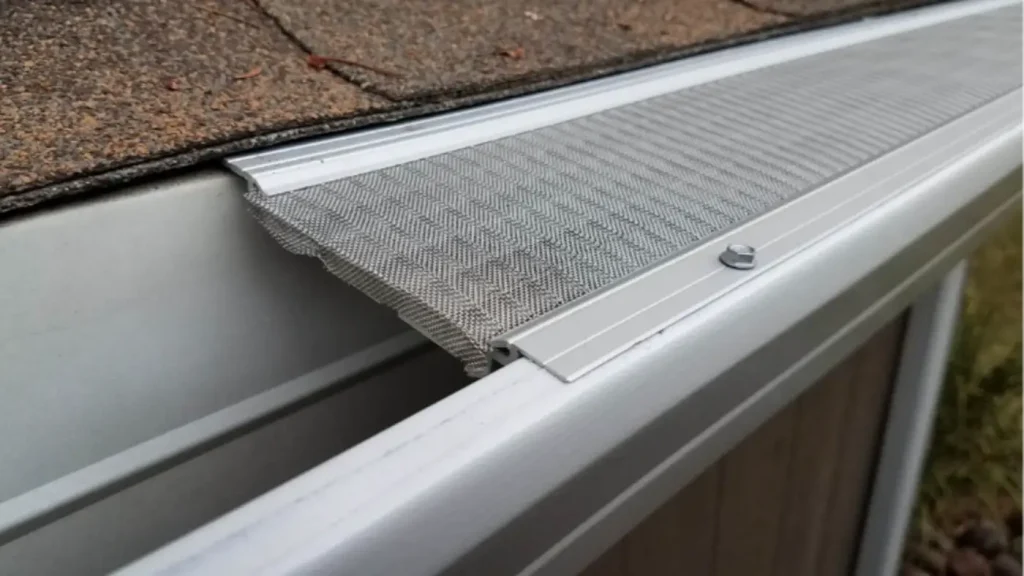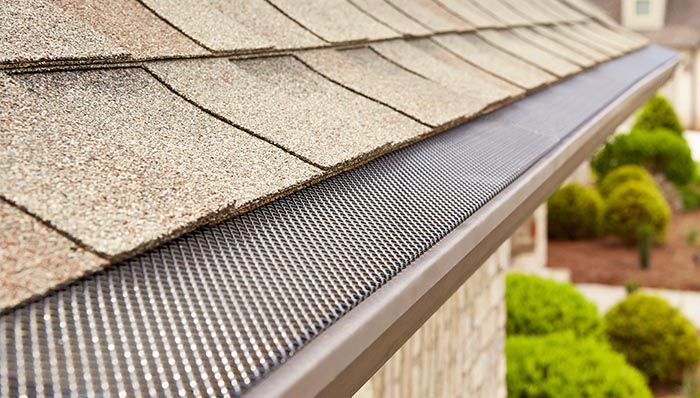Keeping your gutters clean is essential for maintaining the health of your roof, foundation, and overall home structure. However, cleaning gutters can be a tedious and potentially dangerous task. That’s where gutter guards come into play. These protective devices can help prevent debris from clogging your gutters and reduce the need for frequent cleaning. In this blog, we’ll explore what gutter guards are, the different types available, the costs associated with them, and how they are installed.
What Are Gutter Guards?
Gutter guards are protective covers or screens installed over your gutters to keep debris such as leaves, twigs, pine needles, and dirt from clogging the gutter system. By preventing the buildup of debris, gutter guards allow rainwater to flow freely through the gutters and into the downspouts. This helps to prevent water from overflowing and potentially damaging your home’s exterior, roof, or foundation.

Gutter guards are typically made from various materials, including metal, plastic, or foam, and can be designed to fit most types of gutters. While they are not completely maintenance-free, they can significantly reduce the amount of debris that accumulates in your gutters, making gutter cleaning easier and less frequent.
Why Should You Consider Gutter Guards?
There are several compelling reasons to consider installing gutter guards on your home. Here are a few:
- Reduce Maintenance Efforts: Gutter cleaning can be a time-consuming and hazardous task, especially if your home is multi-story. Gutter guards reduce the frequency of cleaning by preventing debris buildup.
- Prevent Water Damage: Blocked gutters can cause water to overflow, potentially damaging the roof, walls, and foundation. Gutter guards help ensure that rainwater flows properly through the system, reducing the risk of water damage.
- Avoid Pest Problems: Clogged gutters provide an ideal environment for pests like mosquitoes, rodents, and insects. Gutter guards keep debris out of the gutters, reducing the chances of pests nesting in them.
- Increase Longevity of Gutters: Regular cleaning and the weight of debris can damage gutters over time. By preventing debris buildup, gutter guards help extend the life of your gutters.
- Improve Curb Appeal: When gutters are clogged with debris, it can be unsightly and detract from your home’s appearance. Gutter guards ensure that your gutters remain clean and neat, enhancing the curb appeal of your home.
Types of Gutter Guards
There are several different types of gutter guards available, each designed to offer a specific set of benefits. The right type for your home will depend on factors such as the amount of debris in your area, the style of your gutters, and your budget. Here are the most common types of gutter guards:
1. Mesh Gutter Guards
Mesh gutter guards are made from a fine mesh material that covers the gutters and allows water to flow through while blocking debris. They are one of the most popular types of gutter guards because of their versatility and affordability. Mesh guards come in various materials, such as stainless steel, aluminum, or plastic.
- Pros: Affordable, easy to install, effective at keeping out debris.
- Cons: The mesh can sometimes get clogged with small debris, such as pine needles, which may require occasional cleaning.
2. Foam Gutter Guards
Foam gutter guards are made of porous foam material that fits directly inside your gutters. They act as a filter, allowing water to flow through while trapping debris on top of the foam. These are a good choice for homeowners who want an easy and inexpensive solution for their gutters.
- Pros: Inexpensive, simple to install, and lightweight.
- Cons: Foam can deteriorate over time, especially in areas with heavy rain or sunlight. Additionally, they may require occasional maintenance to remove built-up debris.
3. Screen Gutter Guards
Screen gutter guards are made of a mesh or perforated metal that fits over the gutter. These are one of the most common types of guards and are known for their durability. The design of the screen allows water to flow through while blocking large debris like leaves and twigs.
- Pros: Durable, easy to install, and effective at blocking large debris.
- Cons: Small debris can sometimes pass through the screen, requiring occasional cleaning.
4. Reverse-Curl Gutter Guards
Reverse-curl gutter guards have a unique design where the edges of the guard curl inward, allowing water to flow into the gutter while preventing debris from entering. They are highly effective at preventing clogs but may require more professional installation.
- Pros: Very effective at keeping out leaves, twigs, and other debris, and they rarely clog.
- Cons: Can be more expensive and may require professional installation.
5. Surface Tension Gutter Guards
Surface tension gutter guards are designed to utilize the surface tension of water to keep it flowing into the gutter. They work by allowing water to adhere to the surface of the guard while diverting debris away. These are ideal for homes that have a lot of debris or heavy rainfall.
- Pros: Very effective at keeping out all types of debris, including small particles.
- Cons: More expensive than other types, and installation can be more involved.
Cost of Gutter Guards
The cost of installing gutter guards can vary significantly depending on the type of guards, the size of your home, and whether you hire a professional or opt for a DIY installation. On average, gutter guards can range from $1 to $25 per linear foot.
- Mesh Guards: Mesh gutter guards typically cost between $1 and $3 per linear foot. They are one of the most affordable options for homeowners.
- Foam Guards: Foam guards are generally priced between $2 and $5 per linear foot. While inexpensive, their lifespan may be shorter than other types of guards.
- Screen Guards: These guards generally range from $3 to $7 per linear foot.
- Reverse-Curl Guards: Reverse-curl guards can be more expensive, typically ranging from $5 to $15 per linear foot, depending on the material and quality.
- Surface Tension Guards: Surface tension guards are the most expensive option, often costing between $7 and $25 per linear foot, with professional installation fees included.
In addition to the cost of the guards themselves, you may need to factor in installation costs, which can range from $100 to $500 or more, depending on the complexity of the job and the number of gutters to be covered.
Installation of Gutter Guards
Gutter guard installation can be a straightforward DIY project or a job that requires professional expertise, depending on the type of guard and your comfort level with home improvement projects.
DIY Installation
If you opt for DIY installation, here are the general steps you will need to follow:
- Clean Your Gutters: Before installing gutter guards, make sure your gutters are thoroughly cleaned and free of debris.
- Measure the Gutter Length: Measure the length of your gutters to ensure you purchase the correct amount of guard material.
- Cut and Fit the Guards: Cut the gutter guards to the appropriate length and fit them over your gutters. Most types of guards are designed to snap into place or attach with screws.
- Secure the Guards: Use screws or clips to secure the guards to the gutters if necessary.
- Test the System: Once installed, test the system by running water through the gutters to make sure the water flows freely.
Professional Installation
If you hire a professional, the installation process will be similar but done by experts who can handle complex installations or unusual roof types. Professional installation can take a few hours to a full day, depending on the size of the home.
Are Gutter Guards Worth It?
Gutter guards are a worthwhile investment for many homeowners, particularly those who have tall homes, lots of trees, or live in areas with heavy rainfall. While the initial cost may seem high, the reduction in maintenance and the protection they provide can save you money in the long run by preventing water damage and prolonging the lifespan of your gutters.

For homeowners who don’t want to deal with constant gutter cleaning or are concerned about potential damage from clogged gutters, gutter guards offer a practical solution. Whether you choose mesh, foam, screen, or surface tension guards, there is a type that will suit your needs and budget.
Conclusion
Gutter guards are an excellent investment for protecting your home from water damage, reducing maintenance efforts, and extending the life of your gutter system. Understanding the different types of gutter guards, their cost, and the installation process will help you make an informed decision when choosing the right option for your home. While there is no one-size-fits-all solution, gutter guards are undoubtedly a wise choice for homeowners looking to keep their gutters clean and functioning properly.
If you’re looking for a reliable partner to help with roofing, gutter, and storm restoration services, Atlas Roofing & Restoration is here to assist you. Our experienced team is committed to providing top-notch services, including gutter guard installation, roof repairs, and restoration solutions, ensuring your home remains safe, secure, and beautiful. Reach out to us today for expert guidance and high-quality service for all your roofing and restoration needs.




